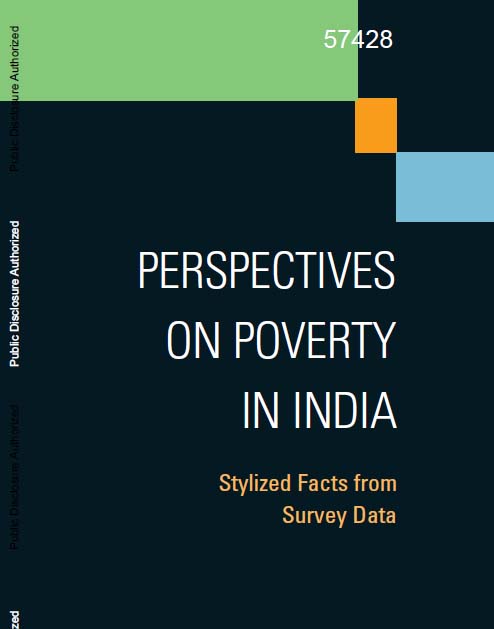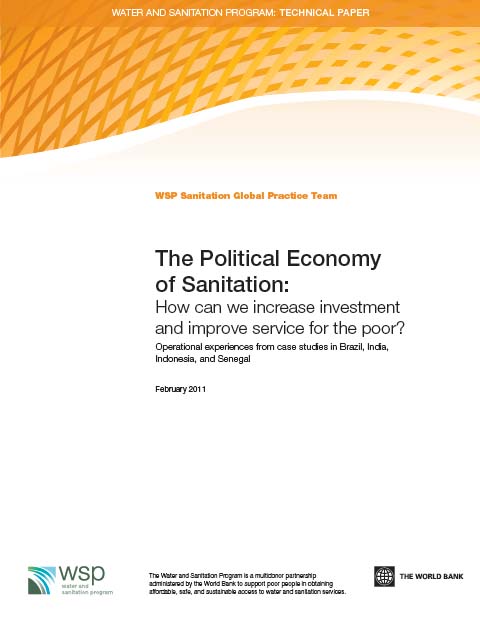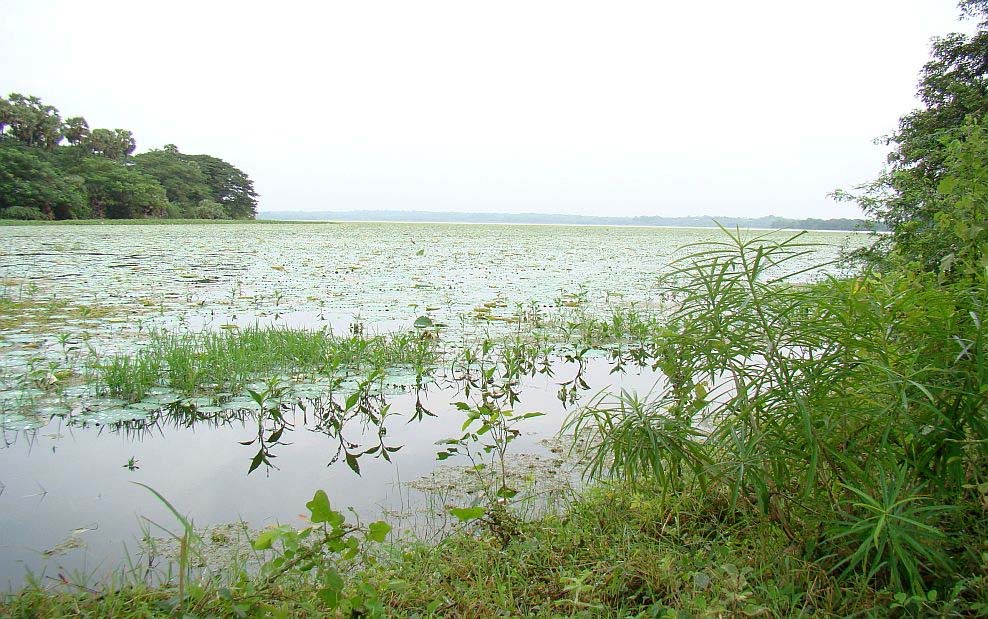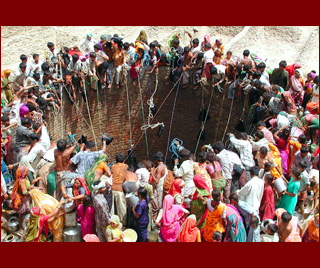/topics/governance
Governance
A kalyani brought to life in Mulbagal, Karnataka: An Arghyam initiative
Posted on 27 Jul, 2011 05:58 PMGuest post by Manjunath Prasad
The sector programme and climate change initiatives in Uttarakhand
Posted on 27 Jul, 2011 02:54 PMRecent scientific studies show that global warming is already causing environmental changes that will have significant global economic and social impacts. As the world's 4th largest emitter of greenhouse gases, India has to juggle the imperative demand for economic development with pressures for greater efficiency in the use of energy.
Climate change is a change in the statistical properties of the climate system when considered over long periods of time, regardless of cause. Climate change reflects a change in the energy balance of the climate system, i.e. changes the relative balance between incoming solar radiation and outgoing infrared radiation from Earth. The threat emanates from accumulated green house gas emissions in the atmosphere, generated through long term and intensive industrial growth and high consumption life styles of developed countries.
Third Sector Partners invites applications for executive director, Mercy Corps India at Delhi – Apply by August 12, 2011
Posted on 27 Jul, 2011 01:36 PMThird Sector Partners, a leading CxO and board search firm in the Not for Profit sector, has been retained by Mercy Corps to hire its Executive Director, India.
Mercy Corps is seeking a bold, action-oriented, and creative leader with a passion for social entrepreneurship to be its Executive Director (ED) for Mercy Corps India (MCI). MCI is a member of the global Mercy Corps family, but is registered as an independent Section 25 company with a separate Board of Directors. The ED must therefore be a shrewd navigator, able to steer our country presence along a truly “local to global” axis as an independent entity, while at the same time maintaining close links to the ethos and administrative structures of the parent company, Mercy Corps.
Intensive field training :Certificate in project planning & grant writing, Grassroots Institute, September 5 – 8, 2011, Nainital
Posted on 26 Jul, 2011 04:47 PM Organizer: Grassroots Institute
Organizer: Grassroots Institute
Venue: Kathgodam, Nainital, India
Description:
This Intensive Field Training (IFT) program will focus more on practice of planning and writing the proposal for getting financial support. The training is fit for NGO managers, government executives and all others who are involved in project management.
Perspectives on poverty in India - Stylized facts from survey data – A report by World Bank
Posted on 26 Jul, 2011 04:38 PM It produces a diagnosis of the broad nature of the poverty problem and its trends in India, focusing on both consumption poverty and human development outcomes.
It produces a diagnosis of the broad nature of the poverty problem and its trends in India, focusing on both consumption poverty and human development outcomes.
It also includes attention in greater depth to three pathways important to inclusive growth and poverty reduction harnessing the potential of urban growth to stimulate rural-based poverty reduction, rural diversification away from agriculture, and tackling social exclusion.
The political economy of sanitation - How can we increase investment and improve service for the poor? – A report by Water and Sanitation Program
Posted on 26 Jul, 2011 02:53 PM This global study attempts systematically to understand and thus help practitioners manage the political economy of pro-poor sanitation investments and service provision.
This global study attempts systematically to understand and thus help practitioners manage the political economy of pro-poor sanitation investments and service provision.
It aims to provide practical advice to multi-lateral agencies and sanitation practitioners to help them better manage stakeholder relations and effectively maneuver within the complex institutional relationships of the sanitation sector in order to enhance the design, implementation, and effectiveness of operations that provide pro-poor sanitation investments and services. The ultimate goal is to improve health and hygiene outcomes.
This study follows current approaches to political economy - interdisciplinary inquiry drawing upon social and political theory and economic principles - to understand how political actors, institutions, and economic processes influence each other. This study’s conceptual framework combines a diagnostic component with a typology of actions to help translate analytical findings into more effective support to operations and investments.
Conservation of Ousteri lake in Puducherry - Draft Comprehensive Management Action Plan by SACON
Posted on 26 Jul, 2011 11:54 AM This Comprehensive Management Action Plan by the Salim Ali Centre for Ornithology and Natural History (SACON) deals with the various conservation and management interventions that can be taken up for long-term sustainability of Ousteri lake, the largest lake in Puducherry.
This Comprehensive Management Action Plan by the Salim Ali Centre for Ornithology and Natural History (SACON) deals with the various conservation and management interventions that can be taken up for long-term sustainability of Ousteri lake, the largest lake in Puducherry.
Wetlands in urban areas have always been exploited for several purposes due to anthropogenic activities. However, such activities may lead to alteration of wetland characteristics and thus cause changes in species composition and density. The Ousteri Lake (Oussudu Eri in Tamil) is rich in flora and fauna and is known to provide several ecological services including recharging underground aquifers and providing several livelihood options for the local community.
Guidelines of the Central Rural Sanitation Programme and Total Sanitation Campaign by the Department of Drinking Water and Sanitation (2011)
Posted on 25 Jul, 2011 07:30 PMThis document by the Department of Drinking Water and Sanitation deals with the guidelines of the Central Rural Sanitation Programme (CRSP) and Total Sanitation Campaign (TSC). India’s first nationwide programme of rural sanitation, the CRSP was launched in 1986, while TSC was launched in 1999 with the aim of ending open defecation.
Fazilka citizens protest against planned encroachment on ecosensitive Badha lake wetland by Punjab Urban Development Authority (PUDA)
Posted on 21 Jul, 2011 04:16 PMForwarded to the portal by: Graduates Welfare Association, Fazilka
India must prepare for future growth by planning a low-water economy - Article in YaleGlobal Online by Rohini Nilekani
Posted on 19 Jul, 2011 12:37 PMArticle and Image courtesy: YaleGlobal Online
Author: Rohini Nilekani
India and China account for one third of the world’s population; each consumes more freshwater than other nations. Per inhabitant per year, though, India uses less than half what’s used in the US, China uses less than one third. This YaleGlobal series examines India and China’s water use, their expectations for rising demand and recognition that shortages will disrupt economic progress.
The Planning Commission of India repeatedly warns that water will become a more serious issue than land or energy for India in years to come, points out Rohini Nilekani, in the second article of the series. India’s transition from an economy based on agriculture to a mixed one, with water use controlled by states rather than the federal constitution, already leads to conflicts. She urges planning for a low-water economy. Good governance and regulatory frameworks can prevent pollution and waste, while encouraging efficiency, reliable and fair allocation, and wise consumer choices.
 Thirsty earth: Indian villagers in Gujarat gather to draw water from a well
Thirsty earth: Indian villagers in Gujarat gather to draw water from a well





